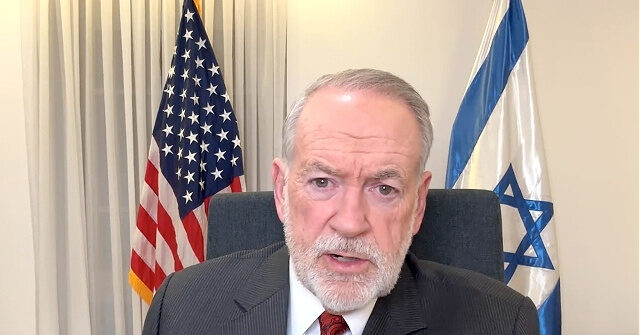Which New Nations Might Join the Abraham Accords?

Future of the Abraham Accords: A Look Ahead
The Abraham Accords have reshaped the geopolitical landscape of the Middle East, fostering new relationships between Israel and several Arab nations. Former Kansas Governor Mike Huckabee, who is currently serving as the U.S. Ambassador to Israel, recently shared his insights on the potential expansion of these accords. Speaking during the Breitbart Founders Club Roundtable, Huckabee suggested that the list of countries possibly joining the Abraham Accords may surprise many Americans. His predictions include nations like Syria, Lebanon, and even Saudi Arabia. This article explores Huckabee's comments and the broader implications of the Abraham Accords for the region.
The Changing Dynamics of the Middle East
The Middle East is undergoing significant transformation, influenced by political, economic, and social factors. The Abraham Accords, signed in 2020, marked a historic shift in relations between Israel and several Arab nations, including the United Arab Emirates (UAE) and Bahrain. These agreements have opened doors for trade, tourism, and diplomatic relations, creating a precedent for future partnerships.
Huckabee's assertion that countries like Syria and Lebanon might consider joining the Abraham Accords raises intriguing questions. Historically, both nations have had strained relationships with Israel. However, as regional dynamics evolve, the potential for normalization may become more appealing.
Benefits of Normalization
One of the key arguments for normalization with Israel is the tangible benefits it offers. The UAE, for instance, has experienced numerous advantages since joining the Abraham Accords:
- Economic Growth: Increased trade relations leading to economic diversification.
- Technological Collaboration: Opportunities for joint ventures in technology and innovation.
- Tourism: Boosted tourism as cultural exchanges become more frequent.
Huckabee highlighted that nations, deep down, understand that they are better off by normalizing relations with Israel. The UAE's willingness to take this step has resulted in remarkable changes and a level of openness that is often rare in the region.
Potential Surprises in the Middle East
Huckabee's prediction about potential surprises from the Middle East is particularly noteworthy. With ongoing geopolitical shifts, countries that have traditionally been resistant to normalization may begin to reassess their positions. There are several factors that could influence this change:
- Economic Incentives: As countries face economic challenges, the lure of partnerships with Israel may become more compelling.
- Security Concerns: Shared threats, such as terrorism and regional instability, could prompt nations to collaborate for mutual security.
- Public Opinion: Changing attitudes among the populace may create demand for more progressive foreign policies.
Syria and Lebanon: A New Frontier?
The mention of Syria and Lebanon by Huckabee is particularly significant. Both nations have long been embroiled in conflict and have faced internal strife. However, as conditions evolve, the potential for peace talks and normalization could emerge. The motivations for these countries might include:
- Reconstruction and Development: Normalizing relations could open avenues for international aid and investment.
- Regional Stability: Collaborating with Israel may provide a pathway to greater security and stability.
- International Relations: A shift in alliances could enhance their standing in the global community.
Saudi Arabia's Role
Saudi Arabia's potential involvement in the Abraham Accords is another fascinating angle. As one of the leading powers in the Arab world, Saudi Arabia’s participation would have monumental implications. Factors that may influence their decision include:
- Economic Diversification: The kingdom's Vision 2030 plan aims to reduce dependence on oil, and partnerships with Israel could facilitate technological and economic collaboration.
- Geopolitical Strategy: Aligning with Israel may strengthen Saudi Arabia's position against common adversaries in the region.
- Public Sentiment: As younger generations emerge, shifts in cultural and political attitudes may pave the way for normalization.
Impact on U.S. Foreign Policy
Huckabee's comments also reflect a broader trend in U.S. foreign policy towards the Middle East. The Abraham Accords represent a shift from traditional approaches focused solely on the Israeli-Palestinian conflict. Instead, they emphasize building alliances based on mutual interests, economic collaboration, and security concerns. This new framework may influence future diplomatic efforts, shaping the U.S.'s role in the region.
The Role of Public Opinion
Public sentiment plays a critical role in the success of any diplomatic initiative. As political leaders consider normalization with Israel, they must also gauge their citizens' attitudes. In many cases, grassroots movements advocating for peace and cooperation can influence decision-making at the highest levels. It remains to be seen how public opinion in countries like Syria, Lebanon, and Saudi Arabia will evolve as discussions about normalization continue.
Challenges Ahead
While the prospects for expansion of the Abraham Accords are promising, challenges remain. Historical grievances, political instability, and entrenched ideologies may hinder progress. Addressing these issues requires careful diplomacy, cultural exchanges, and a commitment to building trust among nations.
Looking Forward: The Future Landscape
The future landscape of the Middle East could be vastly different in the coming years. As more nations consider joining the Abraham Accords, the potential for economic growth, enhanced security, and cultural exchange becomes increasingly plausible. The groundwork laid by the UAE and other nations serves as a model for others to follow, demonstrating that normalization can yield significant benefits.
FAQs About the Abraham Accords
What are the Abraham Accords?
The Abraham Accords are agreements that normalize relations between Israel and several Arab nations, notably the UAE and Bahrain, signed in 2020. These accords aim to foster peace, economic cooperation, and cultural exchanges.
Which countries are expected to join the Abraham Accords next?
Former Governor Mike Huckabee suggested that countries like Syria, Lebanon, and potentially Saudi Arabia may be next to join the Abraham Accords, as regional dynamics shift.
What benefits do countries gain from normalizing relations with Israel?
Countries that normalize relations with Israel can experience economic growth, technological collaboration, improved security, and enhanced international standing.
How do public opinions affect normalization efforts?
Public sentiment plays a significant role in normalization efforts. Leaders must consider their citizens' attitudes towards Israel and peace initiatives when making decisions about foreign policy.
As the Middle East continues to evolve, the prospects for peace and cooperation seem more attainable than ever. The expansion of the Abraham Accords could lead to unprecedented opportunities for nations in the region. How do you envision the future of the Middle East, and what role do you think the Abraham Accords will play in shaping it?
#AbrahamAccords #MiddleEastPeace #Diplomacy
Published: 2025-08-13 01:53:12 | Category: Trump GNEWS Search



